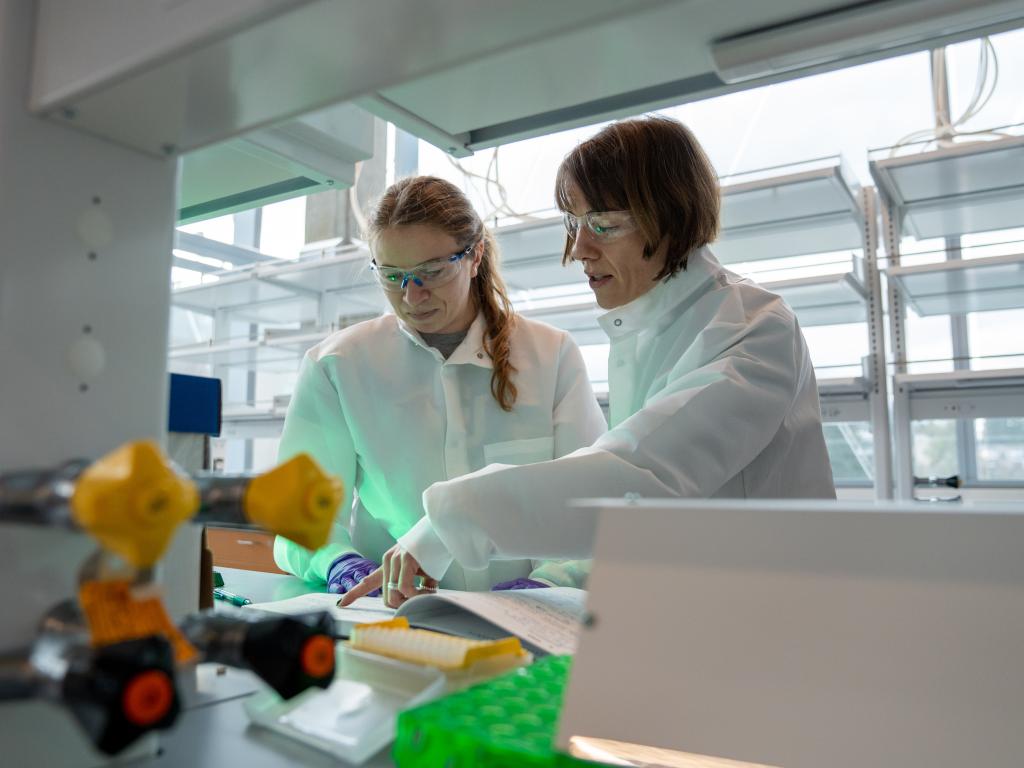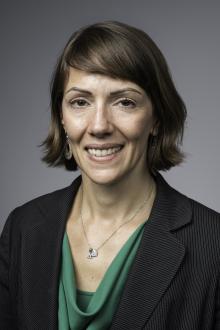
Danielle Benoit, Lorry Lokey Chair of the Department of Bioengineering at the University of Oregon, has been elected to the 2023 class of fellows of the National Academy of Inventors (NAI). The honor recognizes her contributions to the field of biomedical engineering.

“As someone who has always loved designing and building things to make them better and more beneficial to society, it’s a great honor to be recognized by the National Academy of Inventors,” Benoit said. “I’m motivated in my research to improve people’s lives and it means a great deal to join the academy with so many remarkable innovators.”
Benoit joined the Phil and Penny Knight Campus for Accelerating Scientific Impact at the UO in 2022. She was previously the William R. Kenan Jr. Professor of Biomedical Engineering and Director of the Materials Science Program at the University of Rochester.
Benoit was nominated by Stephen Dewhurst, Rochester’s Vice President for Research. At the UO, Robert Guldberg, Vice President and Robert and Leona DeArmond Executive Director of the Knight Campus, recruited Benoit to the UO to serve as the inaugural chair of the Department of Bioengineering.
“For those of us who know Professor Benoit, this recognition comes as no surprise. Her relentless pursuit of excellence in training, teaching, research, and entrepreneurial activities, attracted our eye when we hired her to lead the Department of Bioengineering,” Guldberg said. “This well-deserved recognition reminds us of all the ways she has already made an impact on the world in her career through her remarkable innovations in tissue engineering, bone regeneration, drug delivery, and other inventions in the field of therapeutic biomaterials.”
An NIH- and NSF-funded researcher, Benoit’s work has provided insights into the translation of tissue engineering strategies for bone healing and the development of tissue models to discover new drugs and drug delivery systems.
In bone regeneration, Benoit has discovered new ways to control key interactions responsible for regenerating bone and ensuring that critical processes happen at the correct times. In drug delivery, she has worked in tissue targeting approaches that zero-in on target areas without affecting surrounding tissues, including for chemotherapy.
In total, Benoit holds twelve fully executed US patents and thirty-eight foreign patents that cover seven distinct inventions (patent families) that have been licensed to four companies (PhaseRx, Genevant Sciences GMBH, Johnson&Johnson, and Taithera). She also has five US provisional patents and two invention disclosures pending submission.
It’s been a year of accolades for Benoit, who was also elected to the 2023 class of Biomedical Engineering Society Fellows. She was previously elected to the American Institute of Medical and Biological Engineering and currently serves as deputy editor for Journal of Biomedical Materials Research Part B and associate editor for Science Advances, PLOS One, ACS Applied Biomaterials, Frontiers in Bioengineering and Biotechnology, and Journal of Visualized Experiments. She also serves as an advisory board member to the Journal of Materials Chemistry Part B and on the scientific advisory board of Safar Partners LLC and Taithera Inc.
At NAI, she joins a class of 162 academy fellows, 118 research universities, governmental and non-profit research institutions worldwide. They collectively hold more than 4,600 US patents.
At the UO, other faculty members elected to the academy in the past several years include Anshuman “AR” Razdan, vice president for research and innovation; Susan Sokolowski, professor and director of the Sports Product Design Program, as well as the first Oregon woman to be named a fellow of the academy; Robert Guldberg, as a fellow; Shawn Lockery, a professor of biology, and Keat Ghee Ong, a Professor in the Knight Campus Department of Bioengineering as senior members of the academy.
“The impact of Professor Benoit’s research contributions cannot be understated,” said Anshuman “AR” Razdan, vice president for research and innovation. “We expect that many more innovations are forthcoming from her state-of-the-art lab and will be make great social and economic impacts. Not only that, but we are also confident that Benoit’s leadership of the Department of Bioengineering will produce talented and passionate future professionals for the biomedical workforce.”
